Top Rankings
Belt Elementary School District ranks among the top 20% of public school district in Montana for:
Category
Attribute
Overall Rank
Highest overall rank (Top 5%)
Math Proficiency
Highest math proficiency (Top 5%)
Reading/Language Arts Proficiency
Highest reading/language arts proficiency (Top 10%)
For the 2025 school year, there are 2 public schools serving 244 students in Belt Elementary School District. This district's average testing ranking is 10/10, which is in the top 5% of public schools in Montana.
Public Schools in Belt Elementary School District have an average math proficiency score of 70% (versus the Montana public school average of 36%), and reading proficiency score of 64% (versus the 46% statewide average).
Minority enrollment is 7% of the student body (majority Hispanic and Asian), which is less than the Montana public school average of 23% (majority American Indian).
Overview
This School District
This State (MT)
# Schools
2 Schools
843 Schools
# Students
244 Students
149,705 Students
# Teachers
16 Teachers
10,942 Teachers
Student : Teacher Ratio
15:1
15:1
District Rank
Belt Elementary School District, which is ranked within the top 5% of all 347 school districts in Montana (based off of combined math and reading proficiency testing data) for the 2021-2022 school year.
Overall District Rank
#12 out of 350 school districts
(Top 5%)
(Top 5%)
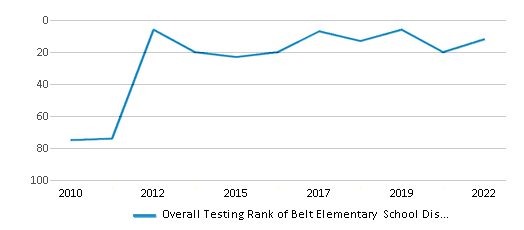
Math Test Scores (% Proficient)
65-69%
35%
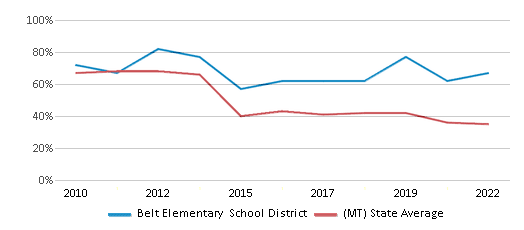
Reading/Language Arts Test Scores (% Proficient)
60-64%
46%
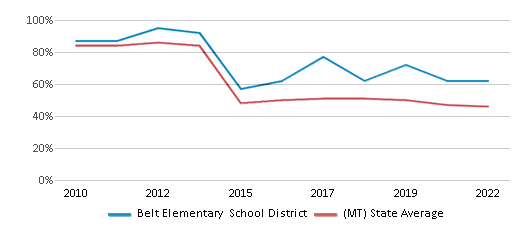
Science Test Scores (% Proficient)
40-49%
37%
Students by Ethnicity:
Diversity Score
0.13
0.40
# American Indian Students
4 Students
15,756 Students
% American Indian Students
2%
10%
# Asian Students
4 Students
944 Students
% Asian Students
1%
1%
# Hispanic Students
5 Students
9,249 Students
% Hispanic Students
2%
6%
# Black Students
2 Students
1,034 Students
% Black Students
1%
1%
# White Students
227 Students
114,928 Students
% White Students
93%
77%
# Hawaiian Students
2 Students
284 Students
% Hawaiian Students
1%
n/a
# Two or more races Students
n/a
7,508 Students
% of Two or more races Students
n/a
5%
Students by Grade:
# Students in PK Grade:
1
1,059
# Students in K Grade:
44
12,088
# Students in 1st Grade:
26
10,993
# Students in 2nd Grade:
24
11,771
# Students in 3rd Grade:
23
11,487
# Students in 4th Grade:
20
11,459
# Students in 5th Grade:
25
11,360
# Students in 6th Grade:
32
11,339
# Students in 7th Grade:
25
11,480
# Students in 8th Grade:
24
11,296
# Students in 9th Grade:
-
11,994
# Students in 10th Grade:
-
11,945
# Students in 11th Grade:
-
11,006
# Students in 12th Grade:
-
10,428
# Ungraded Students:
-
-
District Revenue and Spending
The revenue/student of $12,303 in this school district is less than the state median of $15,263. The school district revenue/student has stayed relatively flat over four school years.
The school district's spending/student of $11,389 is less than the state median of $15,352. The school district spending/student has stayed relatively flat over four school years.
Total Revenue
$3 MM
$2,285 MM
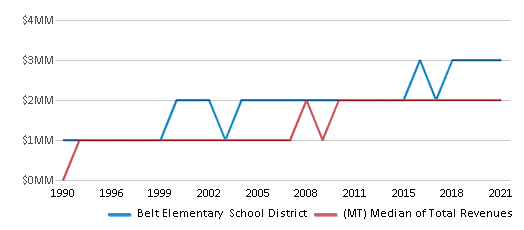
Spending
$3 MM
$2,298 MM
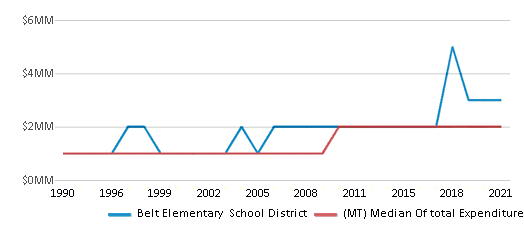
Revenue / Student
$12,303
$15,263
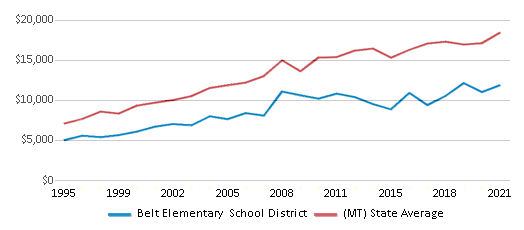
Spending / Student
$11,389
$15,352
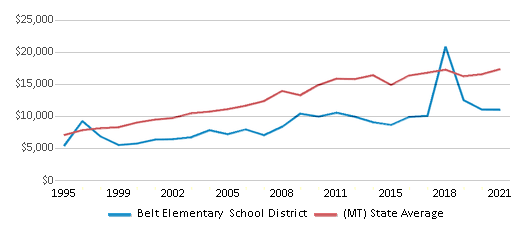
Best Belt Elementary School District Public Schools (2025)
School
(Math and Reading Proficiency)
(Math and Reading Proficiency)
Location
Grades
Students
Rank: #11.
Belt 7-8
(Math: 70-79% | Reading: 70-79%)
Rank:
Rank:
10/
Top 1%10
1 Church Street
Belt, MT 59412
(406) 277-3351
Belt, MT 59412
(406) 277-3351
Grades: 7-8
| 49 students
Rank: #22.
Belt School
(Math: 65-69% | Reading: 55-59%)
Rank:
Rank:
10/
Top 10%10
1 Church Street
Belt, MT 59412
(406) 277-3351
Belt, MT 59412
(406) 277-3351
Grades: PK-6
| 195 students
Frequently Asked Questions
How many schools belong to Belt Elementary School District?
Belt Elementary School District manages 2 public schools serving 244 students.
What is the rank of Belt Elementary School District?
Belt Elementary School District is ranked #9 out of 347 school districts in Montana (top 5%) based off of combined math and reading proficiency testing data for the 2021-2022 school year. This district ranks in the top 20% of Montana school districts for: Highest overall rank (Top 5%), Highest math proficiency (Top 5%) and Highest reading/language arts proficiency (Top 10%)
What is the racial composition of students in Belt Elementary School District?
93% of Belt Elementary School District students are White, 2% of students are American Indian, 2% of students are Hispanic, 1% of students are Asian, 1% of students are Black, and 1% of students are Hawaiian.
What is the student/teacher ratio of Belt Elementary School District?
Belt Elementary School District has a student/teacher ratio of 15:1, which is higher than the Montana state average of 14:1.
What is Belt Elementary School District's spending/student ratio?
The school district's spending/student of $11,389 is less than the state median of $15,352. The school district spending/student has stayed relatively flat over four school years.
Recent Articles

Year-Round Or Traditional Schedule?
Which is more appropriate for your child? A year-round attendance schedule or traditional schedule? We look at the pros and cons.

Why You Should Encourage Your Child to Join a Sports Team
Participating in team sports has a great many benefits for children, there is no doubt. In this article you will learn what those benefits are.

White Students are Now the Minority in U.S. Public Schools
Increasing birth rates among immigrant families from Asia and Central and South America, combined with lower birth rates among white families, means that for the first time in history, public school students in the United States are majority-minority. This shift in demographics poses difficulties for schools as they work to accommodate children of varying language abilities and socio-economic backgrounds.





